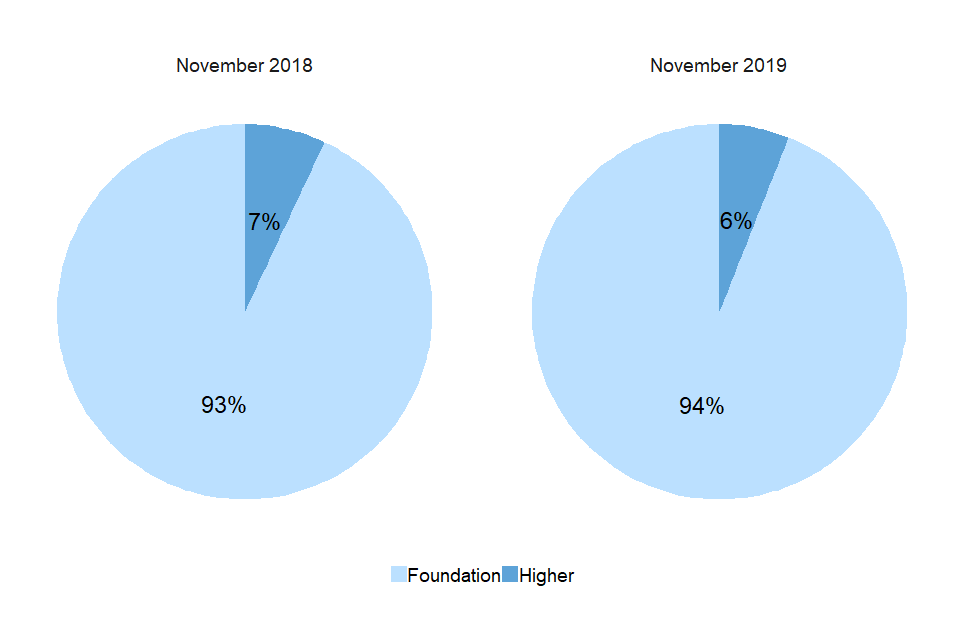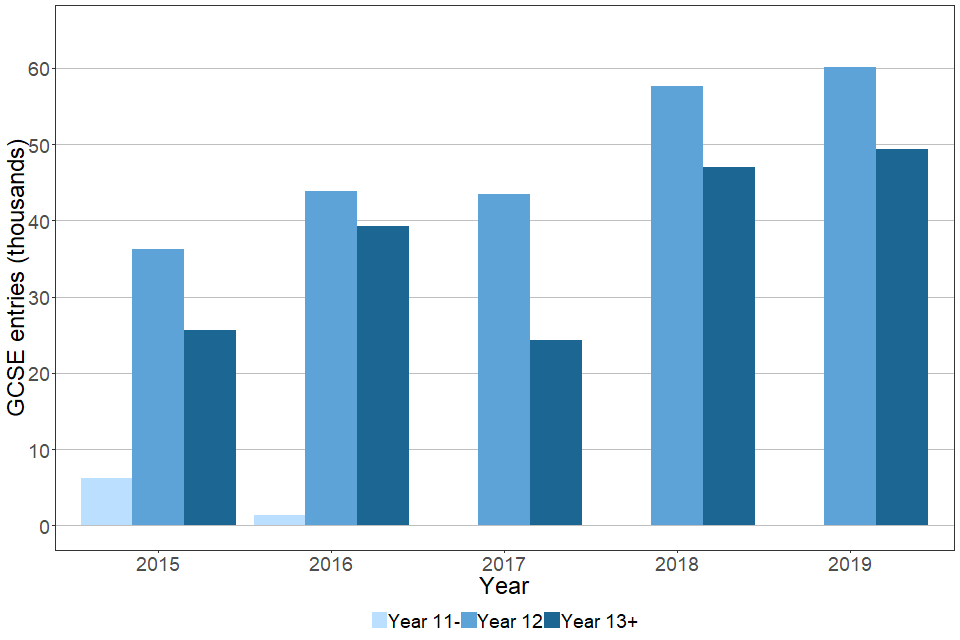Provisional November 2019 exam entries: GCSEs
Published 5 December 2019
Applies to England
This report presents provisional figures on the number of entries for GCSEs submitted by schools and colleges in England to exam boards by 25 October 2019 for exams being sat in November 2019. The November 2019 series is restricted to students who were aged at least 16 by the end of the preceding August. All the November 2019 entries are students sitting GCSE English language and/or GCSE mathematics.
November entries over time

November GCSE entries over time from 2015 to 2019
Overall, GCSE entries in November 2019 increased by 5%, from 104,710 in 2018 to 109,495.
Variations in entries over recent years may reflect changes in study requirements related to the condition of funding, the transition from legacy to reformed qualifications, and availability of assessments.
GCSE mathematics by tier

November GCSE mathematics entry by tier for 2018 and 2019
There were 55,955 entries in GCSE mathematics in November 2019. In comparison, November 2018 saw 55,125 entries for GCSE mathematics.
Similar to previous years, the majority (94%) of entries in 2019 were for the foundation tier.
November GCSE entries by subject

November GCSE entries by subject from 2015 to 2019
The change in GCSE mathematics entries in November 2019 represent a 2% increase on 2018.
Entries in English language also saw an increase to 53,540, representing an 8% increase on 2018, continuing the trend seen during the previous 4 years.
GCSE entries by year group

November GCSE entries by year group from 2015 to 2019
Year 12 entries increased by 4% from 57,650 in 2018 to 60,090 in 2019.
Year 13 entries increased by 5% from 47,010 in 2018 to 49,400 in 2019.
Summary of entries in the November series for 2018 and 2019
| Overall Entries | 2018 | 2019 | % change |
|---|---|---|---|
| GCSE English language | 49,585 | 53,540 | 8% |
| GCSE mathematics | 55,125 | 55,955 | 2% |
| Total | 104,710 | 109,495 | 5% |
November entries have varied over the previous 4 years which likely reflects a combination of factors including the transition from legacy to reformed qualifications and study requirements related to the condition of funding.
| Entries by year group | 2018 | 2019 | % change |
|---|---|---|---|
| Year 12 English language | 28,475 | 30,420 | 7% |
| Year 12 Mathematics | 29,175 | 29,670 | 2% |
| Year 12 - total | 57,650 | 60,090 | 4% |
| Entries by year group | 2018 | 2019 | % change |
|---|---|---|---|
| Year 13 & above English language | 21,100 | 23,120 | 10% |
| Year 13 & above Mathematics | 25,910 | 26,285 | 1% |
| Year 13 & above - total | 47,010 | 49,400 | 5% |
In November 2019, entries have increased for students in Year 12 and Year 13 and above compared to 2018. The largest overall increase is for English language and much of this rise comes from the increase in entries in Year 13 and above.
Mathematics tier entries in the November series for 2018 and 2019
| Mathematics entries by tier | 2018 | 2019 | % change |
|---|---|---|---|
| GCSE mathematics foundation tier | 51,440 | 52,860 | 3% |
| GCSE mathematics higher tier | 3,685 | 3,095 | -16% |
| Total | 55,125 | 55,955 | 2% |
GCSE mathematics is a tiered qualification. As seen in previous years, most entries for GCSE mathematics in November 2019 were for the foundation tier.
This suggests that the majority of entries have been made by candidates who are re-sitting the foundation tier so that they may continue studying and be funded post-16.
Background information
In this release, Ofqual presents data on the number of provisional entries for GCSEs in England received by exam boards for the November 2019 exam series. The entries that schools and colleges can make with exam boards to sit exams in November is restricted to post-16 students.
The figures for entries can change daily up to the day of the exams. We collect provisional data at the point when it is reasonably complete, although final entry numbers may be slightly different from these. The figures presented here are the provisional figures as submitted by schools and colleges to exam boards by 25 October 2019.
In England, GCSE English language and GCSE mathematics exams are available in November, but only for students who were aged 16 or above on 31 August of that year. In this release, all figures are rounded to the nearest 5 to ensure confidentiality of data.
Further information on this release is available in the background information as well as data tables accompanying this release.
User feedback
We welcome your feedback on our publications. Should you have any comments on this statistical release and how to improve it to meet your needs please contact us at data.analytics@ofqual.gov.uk.
Head of profession: Vikas Dhawan

